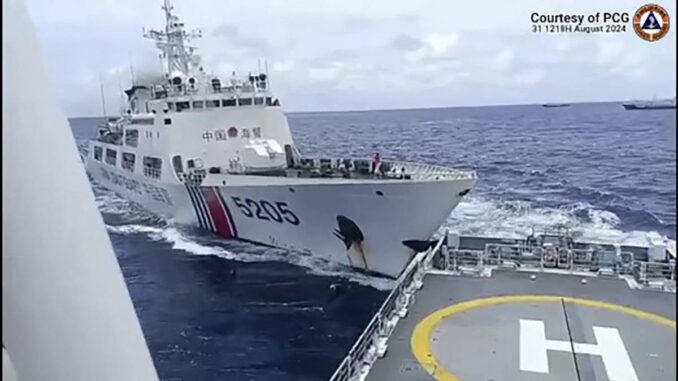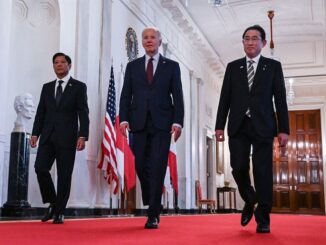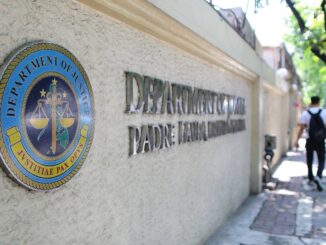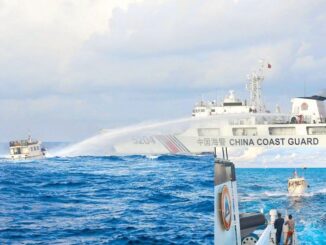
THE Philippines expressed its displeasure to China over the “intentional” ramming by a China Coast Guard vessel into the BRP Teresa Magbanua in Escoda Shoal over the weekend, even as Japan, Australia and the European Union called out Beijing for its “dangerous actions” in the South China Sea.
“We have made the necessary approaches to China in terms of contacting them through various means to express our complaint and displeasure at what happened,” said Foreign Affairs Secretary Enrique Manalo on the sidelines of the opening of the 2024 National Peace Consciousness Month.
Manalo said the BRP Teresa Magbanua, the biggest ship of the Philippine Coast Guard (PCG), merely heaved its anchor with the intent of loitering around Escoda (Sabina) Shoal when it was rammed by a Chinese vessel.
This frame grab from handout video footage taken and released on August 31, 2024 by the Philippine Coast Guard (PCG) shows a Chinese coast Guard ship (left) colliding with Philippine Coast Guard ship BRP Teresa Magbanua near the Sabina Shoal in disputed waters of the South China Sea. AFP PHOTO / PHILIPPINE COAST GUARD (PCG)
He said they were contemplating whether to file another arbitral case against Beijing on the heels of its aggressive maneuverings in the contested waterway.
Meanwhile, the Japanese Embassy in Manila issued a statement accusing China of misrepresenting Japan’s position on the case.
“We will not repeat here our positions on each of the points raised as we do not wish to divert attention from the central issue, which is the recent dangerous actions in the South China Sea,” the embassy said.
The South China Sea is directly related to the peace and stability of the region and is a legitimate concern of the international community, the Japanese statement said. “As a stakeholder that makes use of the South China Sea, the issue is also an important matter of interest for Japan, which depends on sea transport for most of its resources and energy.”
“The international community, including Japan, has repeatedly expressed serious concerns over repeated actions in recent days that increase regional tensions. Japan will continue to emphasize the importance of maintaining freedom of navigation and overflight consistent with Unclos (the United National Convention on the Law of the Sea) and reiterate our strong opposition to any unilateral attempts to change the status quo by force or coercion.
“Additionally, Japan has pointed out that China’s assertions regarding baselines in the South China Sea are not based on the relevant provisions of Unclos and that it is important to protect the freedom of navigation and overflight. Unclos sets forth the conditions for the application of baselines in a specific and exhaustive manner, whereas China has failed to invoke the relevant provisions of Unclos in asserting the lawfulness of the baselines in question. Japan has pointed out that the Arbitral Tribunal ruled that the ‘historical rights’ based on the ‘nine-dash line’ claimed by China were found to be contrary to Unclos and were clearly denied.
“Regrettably, China has not changed its position of not accepting the Arbitral Tribunal’s award to the Philippines and China and has continued to assert maritime claims that are inconsistent with the Unclos. Taking this opportunity, Japan refers to Article 296 of Unclos, which articulates that any decision rendered by a tribunal having jurisdiction under Unclos shall be final and shall be complied with by all the parties to the dispute.
“Japan will continue working in coordination with the international community to maintain and strengthen the free and open international order based on the rule of law.”
Australia also shared the Philippines’ condemnation of China’s destabilizing conduct in the region, saying this undermined recent commitments to de-escalate tensions in the South China Sea.
In a statement on Monday, Australia’s Department of Foreign Affairs and Trade (DFAT) expressed concern about the “series of dangerous and assertive actions by China against the Philippines, including on 19, 25, and 31 August near Sabina (Escoda) Shoal.”
“This included the repeated and intentional ramming of Philippine vessels, causing structural damage, and the use of water cannons,” DFAT said.
“It poses serious risks of harm to crew and undermines recent commitments to de-escalate tensions in the South China Sea,” Canberra said.
Australian Ambassador to Manila Hae Yu reposted the DFAT’s statement on her X social media account.
Australia urged China “to cease these actions, resolve disputes peacefully and adhere to international law, particularly the Unclos and conventions on the prevention of collisions at sea.”
It called for restraint and reiterated that the 2016 South China Sea Arbitral Award “is final and legally binding on the parties.”
The European Union also condemned the dangerous actions by China Coast Guard vessels against lawful Philippine maritime operations in the SCS on August 31.





Be the first to comment